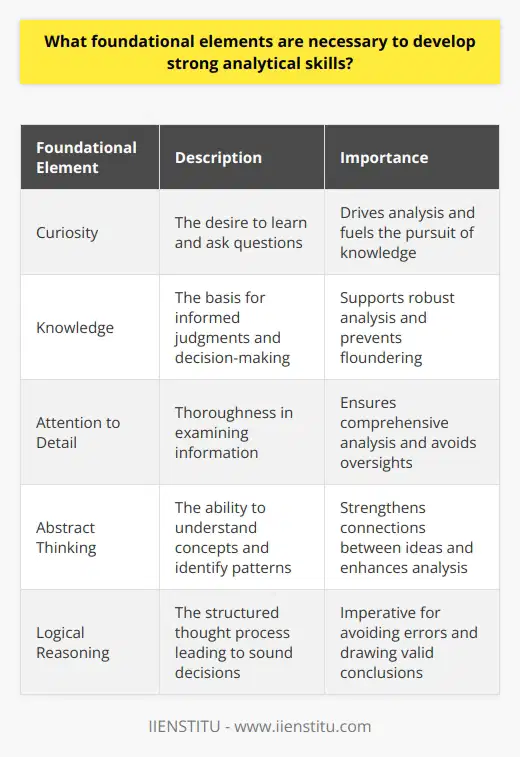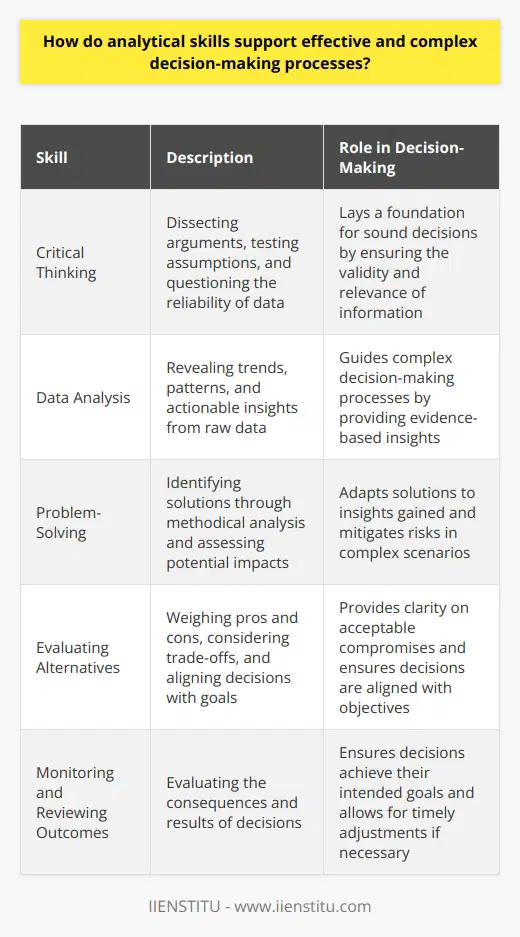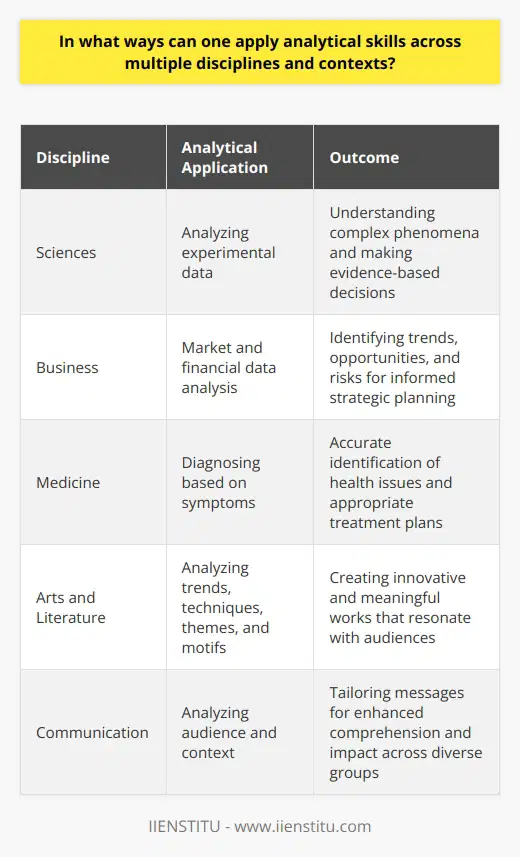
In today's fast-paced, data-driven world, analytical skills have become the linchpin of effective problem-solving and decision-making. These skills enable individuals to parse complex information, discern patterns, weigh options, and formulate solutions that are both logical and creative. As Howard Gardner might articulate, there is a certain kind of intelligence that thrives on critical analysis and objective assessment, deemed essential across all disciplines and professions. This blog aims to dissect the intricacies of analytical aptitude, illuminating its core elements, avenues for refinement, and practical applications. Beginning with a primer on what these skills encompass, the blog will navigate through strategies for development and culminate with real-world examples, demonstrating the profound impact analytical skills have on both our careers and daily lives.
Understanding Analytical Skills
Key Concepts in Analytical Skills
Analytical skills encompass a broad suite of competencies but pivot primarily around core abilities like critical thinking, data interpretation, and effective problem-solving. Critical thinkers challenge assumptions, are sufficiently sceptical of the givens and seek out the veracity in arguments. On the other hand, data interpretation is about looking beyond the numbers and finding the narrative they tell—an imperative skill in a world awash with information. Lastly, problem-solving and decision-making are the natural progressions from critical thinking and data interpretation, synthesizing the analysis into actionable steps or concrete decisions.
Different Types of Analytical Skills
Diving deeper into the realm of analytical prowess, we unearth specialized skill sets such as quantitative analysis and qualitative analysis. Quantitative analysis dives into numerical data, deploying statistical tools to deduce patterns and conclusions, while qualitative analysis leans on non-numerical data to uncover themes and conceptual insights. Risk analysis is yet another subcategory focusing on forecasting and mitigating potential problems, highly valued in fields such as finance and operations. Financial analysis, a sector-specific analytical skill, scrutinizes economic data to make informed business decisions—crucial for fiscal health and strategic growth.
Role of Analytical Skills in Academics and Profession
Embedded within academic and professional success are strong analytical skills, the engines driving innovation, efficiency, and advancement. They undergird research projects that push scientific boundaries, support complex legal reasoning, and facilitate medical diagnoses. In the workplace, they empower employees to dissect market trends, optimize organizational processes, or interpret customer behaviour—all with the goal of gaining competitive advantages or improving results.
Developing Your Analytical Skills
Cognitive Practices to Enhance Analytical Skills
To develop one's analytical skills, embracing cognitive practices such as mindfulness and observation is key. These practices encourage a heightened awareness of surrounding details and subtleties, fostering a deeper understanding of various situations. Moreover, active learning—the pursuit of knowledge through engagement and reflection—is paramount, as it propels individuals to question, ponder, and apply new concepts. Engaging in regular problem-solving exercises ensures these skills remain sharp and ready to tackle a plethora of challenges head-on.
Benefits of Developing Analytical Skills
Honing these elusive talents unlocks numerous advantages—most notably, markedly improved decision-making capabilities. Individuals with refined analytical skills can survey options with greater clarity, avoid cognitive biases, and make strategic choices. Additionally, enhanced problem-solving abilities ensure that, regardless of complexity, solutions can be found efficiently and effectively. For upwardly mobile professionals, these skills are synonymous with better occupational prospects and higher potential for leadership roles.
Examples of Activities to Cultivate Analytical Skills
Activities such as puzzle solving engage the mind in new and complex ways, training it to approach problems from different angles. Reading and analysing case studies from various fields can exemplify the application of theory to practical scenarios, while participation in debates and discussions pushes individuals to articulate and defend positions using logic and evidence. These varied activities develop analytical acumen in tangible, measurable increments.
Application of Analytical Skills in Real-World Scenarios
Utilization of Analytical Skills in Professional Environment
In a professional context, analytical skills are at the heart of efficient project management, allowing managers to sequence tasks, allocate resources, and anticipate roadblocks. They also play a critical role in financial forecasting, where assessing risk and estimating financial outcomes can make or break a company's strategy.
Application of Analytical Skills in Academics
Academically, these skills empower students to excel in research and thesis work, fostering an ability to sift through literature and construct innovative arguments. Moreover, they sharpen the mind for engaging in critical evaluations and reviews, carving out a deeper understanding of a subject through the rigorous assessment of scholarly work.
Everyday Life Usage of Analytical Skills
On a personal level, analytical skills aid in making informed decisions, such as choosing the right financial investments or navigating complex personal matters. They also come into play for problem-solving in personal life, including conflict resolution and long-term planning.
Use Cases Illustrating the Importance and Impact of Analytical Skills
Real-world examples abound where analytical skills have proven decisive—consider the strategic decisions in international diplomacy, or the quick problem resolution in emergency rooms around the globe. Each scenario underscores how pivotal these skills are in fostering successful outcomes.
Conclusion
Recapitulation of Key Points
This article has explored the critical components of analytical skills, their multifaceted benefits, and the ways individuals can cultivate them. We've delved into how these skills play out in various contexts and the immense value they bring to one’s professional and personal life.
Importance of Continual Development and Utilization of Analytical Skills
Given the dynamic nature of today's world, where information is incessant and problems multifarious, the importance of continual development and utilization of analytical skills cannot be overstated. The pursuit of excellence in this area is both a journey and a destination—one that pays dividends at every turn.
Final thoughts on the significance of analytical skills in one's personal and professional life.
Ultimately, the confluence of analytical insights with personal wisdom is where true mastery lies. Individuals adept in these competencies not only navigate life's vicissitudes with grace but also contribute to the betterment of society at large. Whether sharpened through an online certificate course or refined via daily practice, these skills are the quintessential tools for a lifetime of adept problem-solving skills training and informed decision-making.
Frequently Asked Questions
What foundational elements are necessary to develop strong analytical skills?
Understanding Critical Thinking
Strong analytical skills rest on critical thinking. Critical thinking involves systematic processing. It demands careful evaluation of information.
Components of Analytical Abilities
Analytical skills require several foundational elements.
Curiosity is key. It drives the desire to learn. Curiosity prompts questions. These questions fuel analysis.
Knowledge is crucial. It forms the skills' basis. Without knowledge, analysis flounders. Knowledge supports informed judgments.
Attention to Detail is necessary. It ensures thoroughness. Details can change outcomes. This trait avoids oversights.
Abstract Thinking is foundational. It allows conceptual understanding. With abstract thinking, patterns emerge. Connections between ideas strengthen.
Skepticism maintains analytical integrity. It instills a questioning attitude. Skepticism challenges assumptions. Robust conclusions follow.
Logical Reasoning is imperative. It defines thought structure. Logic leads to sound decisions. Without it, errors proliferate.
Communication Skills are essential. Analysis requires clear expression. Confusion diminishes with effective communication. Good communicators simplify complex ideas.
Cultivating Analytical Skills
Developing analytical skills involves practice. Consistent application refines them.
Learning Strategies
- Seek diverse perspectives.
- Engage in intellectual discussions.
- Solve varied problems.
Practical experience builds expertise. Mistakes promote growth. Corrections lead to mastery.
Observation is a learning tool. It reveals methods and approaches. Watching experts provides insight. Mimicry can start skill development.
Self-reflection enhances learning. It encourages an awareness of thinking. Reflection spots flaws and biases. Improvement follows self-awareness.
Teaching others reinforces knowledge. It clarifies one's understanding. Concepts become clearer when explained. Teaching involves learning twice.
Tools and Resources
- Books offer theoretical knowledge.
- Courses provide structured learning.
- Seminars introduce new concepts.
Technology supports skill enhancement. Software teaches and tests skills. Online forums foster discussion. Collaboration occurs digitally.
Maintaining Analytical Sharpness
Continued growth is necessary. Skills can atrophy without use. Regular practice maintains sharpness.
Staying Informed
Keeping updated is crucial. Changes occur rapidly. Stagnant knowledge becomes obsolete. Learning must never cease.
Adapting to New Challenges
Flexibility ensures relevance. Problems evolve. Solutions must too. Adaptation is survival.
In conclusion, strong analytical skills require commitment. They demand a mix of knowledge, critical thinking, and practical application. Education fosters development. Experience hones skills. The quest for knowledge never ends.

How do analytical skills support effective and complex decision-making processes?
The Role of Analytical Skills
Analytical skills empower individuals to dismantle complex problems. They help scrutinize information critically. Decision-making thrives on such analyses. It balances multiple variables and outcomes. Good decisions often stem from rigorous analysis.
Understanding Analytical Skills
Analytical thinking breaks down intricate issues. It fosters clarity and comprehension. Data is central in this process. Skills include critical thinking and problem-solving. Attention to detail is likewise crucial. They foster effective decision-making.
Decision-Making Enhanced by Analysis
Complex decisions demand comprehensive evaluation. Analytical skills meet this need head-on. They allow decision-makers to see different perspectives. Options are weighed with precision. Uncertainty decreases. Confidence in outcomes increases.
Critical Thinking and Decision-Making
Critical thinking dissects arguments and ideas. It tests assumptions. Questions the reliability of data. This lays a foundation for sound decisions.
Data Analysis for Informed Decisions
Data analysis reveals trends and patterns. It translates raw data into actionable insights. These insights guide complex decision-making processes.
Problem-Solving in Complex Scenarios
Problem-solving involves identifying solutions. These are not merely guesses. They arise from methodical analysis. It assesses potential impacts. Solutions adapt to insights gained.
- Creating a Decision-Making Framework
- Evaluating Alternatives
- Mitigating Risks
Each of these relies on analytical skills. They form a structured approach to decision-making.
Implementing Analytical Skills in Decision-Making
Gather relevant information first. Dissect it to understand underlying factors. Look for logical connections. Predict outcomes based on historical data.
Identify Goals and Objectives
Clear goals direct the decision-making process. Analytical skills help align goals with data.
Assess Resources and Constraints
Every decision operates within limits. Analytical skills evaluate these realistically.
Weigh Pros and Cons
No decision is without trade-offs. Analysis provides clarity on these. It aids in judging which cons are acceptable.
Monitor and Review Outcomes
Decisions bear consequences. Analytical skills do not end with a decision. They evaluate results. Ensure decisions achieve their intended goals.
Conclusion
Analytical skills are indispensable for complex decision-making. They bring structured, evidence-based reasoning to the table. These skills turn information into informed choices. The result is decisions made with confidence and clarity.

In what ways can one apply analytical skills across multiple disciplines and contexts?
Analytical Skills Across Disciplines
Analytical skills refer to the ability to deconstruct information. They involve critical thinking, attention to detail, and the capacity for complex reasoning. People apply these skills to solve problems, make decisions, and gather insights. Various fields demand analytical proficiency, yet the application methods can differ.
Understanding Data
Data analysis is fundamental across disciplines. In sciences, one often analyzes experimental data. The business world demands market and financial data analysis. Social sciences rely on statistical patterns. Analytical skills enable the understanding of vast data sets. They support making informed decisions based on evidence.
Problem-Solving
Every field has unique challenges. Medicine demands diagnosis based on symptoms. Engineering requires solving structural problems. Literature involves teasing out themes and motifs. Analytical skills help identify issues and devise strategies to address them.
Decision-Making
Decisions shape outcomes in every domain. In policy-making, leaders must weigh potential impacts. Educators decide on methods to best impart knowledge. Marketers choose strategies based on consumer behavior. Analytical skills aid in assessing options and predicting consequences. This leads to better decision-making.
Enhancing Creativity
One often overlooks the link between analysis and creativity. Artists analyze trends and techniques to create. Writers use analysis to develop plot and character. Designers apply it to balance function and aesthetics. Analytical skills involve dissecting a status quo. This process often sparks innovative thinking.
Improving Communication
Effective communication is crucial. One must analyze the audience and context. Scientists explain their findings to diverse audiences. Lawyers present arguments to juries. Educators break down complex topics for students. Analytical skills help tailor messages to enhance comprehension and impact.
Building Interdisciplinary Links
We live in an interconnected world. No field exists in isolation. Economics impacts healthcare. Technology influences education. Environmental issues touch almost every industry. Analytical skills help draw connections between seemingly disparate sectors. They foster a comprehensive understanding that leads to holistic solutions.
In summary, analytical skills serve as a versatile tool. They apply across disciplines and contexts in numerous ways. Whether in interpreting data, solving problems, making decisions, fostering creativity, communicating effectively, or linking different fields, analytical skills are indispensable. Understanding their universal application only enhances their value.



